Photo

“The Crows buy all their assassins that way. Buy them young, raise them to know nothing else but murder. And if you do poorly in your training, you die.”
25K notes
·
View notes
Audio
Anders: What is it with you archers and your grandfathers’ bows?
Anders: Did none of you get along with your fathers?
Sebastian: What is he talking about?
6K notes
·
View notes
Text
How to make a slave class: an essay on evil
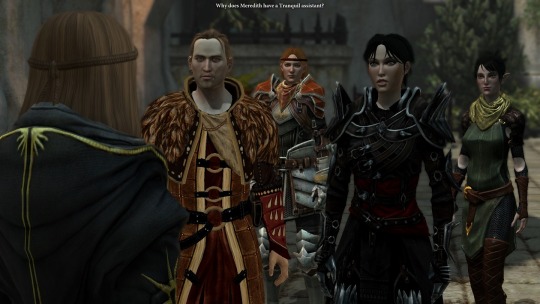
Hawke: Why does Meredith have a Tranquil assistant?
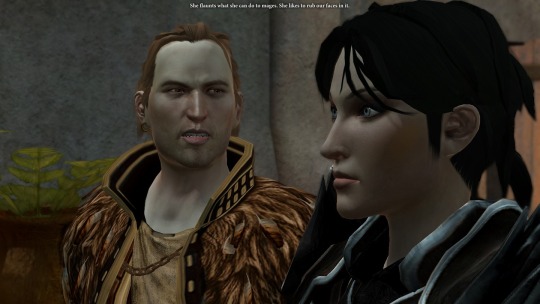
Anders: She flaunts what she can do to mages. She likes to rub our faces in it.
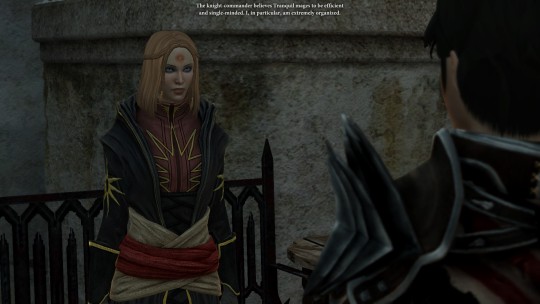
Elsa: The knight-commander believes Tranquil mages to be efficient and single-minded. I, in particular, am extremely organised.
It is insidious. It is vile. It is the work of centuries. The Chantry has created a class of utter non-persons, whom even their fellow prisoners in the Circles of Thedas do not think to defend.
Look at Anders, here. In Dragon Age 2, Anders is the voice of mage freedom. There are others in the world, of course: Fiona has been fighting for her people for some time, and the Resolutionists are out there – somewhere – striving to break free of the Chantry. But they’re not here now, in Hawke’s story. Here, Anders is the one who reminds Hawke and the player of the suffering in the Gallows, and that it is not just in the Gallows: in Circles all over the continent, many mages suffer as the Kirkwall ones do, if not quite so publicly and with such startling frequency.
But here? He does not talk to Elsa. He does not engage with her. He talks about her to Hawke, and he makes it clear that he regards her position as both a threat and an insult to the mages. He’s probably right. Meredith is like that.
Elsa is not a person to Anders. She is, at best, a walking corpse – the shadow of whoever she used to be. At worst she is a psychological weapon, who can do nothing but harm the survivors in the Gallows: those mages who have not yet been given the brand. Anders has given up on Elsa.
And that’s exactly what the bastards want.
The Tranquil are the least understood but most visible members of the Circle. Every city of respectable size boasts a Circle of Magi shop, and every one of these shops is run by a Tranquil proprietor.
The name is a misnomer, for they are not tranquil at all; rather, they are like inanimate objects that speak. If a table wished to sell you an enchanted penknife, it could pass as one of these people. Their eyes are expressionless, their voices monotone. Incomparable craftsmen they might be, but they are hardly the sort of mages to put ordinary folk at ease.
– In Pursuit of Knowledge: The Travels of A Chantry Scholar
Genitivi is undeniably among the less hostile Chantry scholars. While certainly true to his faith, he tries to be aware of his biases and his interest in other cultures is genuine. Nevertheless, he is a product of Chantry indoctrination. Look how easily, how comfortably, he assures you that the Tranquil are not people. They are not humans or elves. They are furniture, to be used and discarded.
Genitivi’s books are popular: there’s a reason he pops up so often in the Codex. Think of all the people who read this, and then ignored bruises they saw on Tranquil faces, ignored Tranquil voices that described beatings and other abuse. Think of the ones who went further – who understood that peasants, elves and mages might be lowly people, but if cornered they might still fight back … but that the Tranquil would not. And really, if you break a table you can just get a new one.
The Templars gathered you for your Harrowing in the middle of the night, without warning. Succeed at the test and you were a mage in full. Fail and you were dead. If you refused the test, you were put through the Rite of Tranquillity and rendered an emotionless neuter. It was a preferable fate for some, but Rhys found that hard to believe – he couldn’t get near a Tranquil without shuddering. He would rather be dead than spend the rest of his life looking at the world through those dead eyes.
– Dragon Age: Asunder
The amount of terror and loathing the Circle has instilled in mages for the Tranquil is appalling. Consider Rhys’s word choice here: emotionless neuter, shuddering, dead eyes. He is afraid of the Tranquil, yes, but they also disgust him. They symbolise failure and hopelessness to him. In theory, a mage’s greatest fear is becoming possessed by demons. But in practice, they mostly fear being made Tranquil.
Imagine being an apprentice mage. Say – eighteen or nineteen. You’re anxious perhaps, or not especially skilled at magic. You don’t want to fight anything, and your teachers and your fellow apprentices do nothing but remind you, whether they mean to or not, that your Harrowing must come soon … and you’re not going to make it.
So when the Templars come, you tell them no. You won’t take this terrible, mysterious test of theirs. They can’t make you. And no – they really can’t. So they drag you away to wherever they keep that lyrium brand of theirs, and they do what they do with it.
And when it’s done, you have no friends. No one wants to look at you. Any friend you had among the apprentices will shy away, sickened and horrified: they know that any day now, they might be mutilated like you. No one wants to talk to you. No one wants to hear about what you do – or what has been done to you. But it doesn’t matter, right? You’re just furniture now. Nothing could possibly be wrong with you. Even if you are a bit battered around the edges, it couldn’t bother you any more than a dent would bother a table.
Avexis, in Haven, says she would not accept the cure for Tranquillity because she does not believe she would survive it, given the terrible things that have happened to her while Tranquil. This young elven woman was once perhaps the most visible mage in Thedas (I mean, talking to dragons is pretty noticeable) and the Right Hand of the Divine should have had an eye on her. But she was made Tranquil, and no one noticed her enough to even stop people hurting her. In Inquisition she isn’t even named; you have to infer her identity from her damn ambient dialogue. The girl who could talk to dragons is rendered invisible by her Tranquillity.
It is even dubious whether Tranquil actually count as mages. Certainly the official stance seems to be yes:
The Tranquil, ironically, resemble sleepwalkers, never entirely awake nor asleep. They are still part of our Circle, however, and some might say they are the most critical part. They have incredible powers of concentration, for it is simply impossible to distract a Tranquil mage, and this makes them capable of becoming craftsmen of such skill that they rival even the adeptness of the dwarves. The Formari, the branch of the Circle devoted to item enchantment, is made up exclusively of Tranquil, and is the source of all the wealth that sustains our towers.
– On Tranquillity and the Role of the Fade in Human Society
… but the general feeling seems to be no:
“Yet here I am. Ask yourself which possibility is more likely.” It chuckled at her grim expression. “Ah, yes. If the Rite of Tranquillity can be undone, Templars would have to watch over the Tranquil as well as the mages. Suddenly no one is safe.”
The commons was crowded, just as Adrian had often seen it before. People stood in clumps, speaking of things in calm whispers. None of them were mages, however. They were all Tranquil. All of them.
– Dragon Age: Asunder
Notably, waaaay up at the top of this post, Elsa takes a stand on this: Tranquil mages, she says. It’s a subtle rebuke and I doubt Anders picks it up, but it’s there. She is a mage, and she is of the Circle. And right now she’s facing the possibility of an Annulment just like everyone else.
Mages are stateless persons: they are Chantry wards, and may be transferred between Circles without their consent. No government has the right to protect its mage citizens – although some do try. But the Tranquil don’t belong even among mages. Damn near no one is listening to the mages’ cries for help – but no one can even grasp that a Tranquil might ever need help.
So, we have established that the Tranquil are people to whom you can do anything, and it doesn’t matter because they won’t feel it anyway. But it does not follow from there that they will do anything:
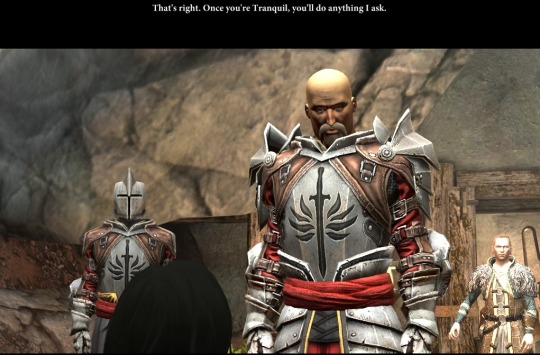
Ser Alrik: That’s right. Once you’re Tranquil you’ll do anything I ask.
This is the Chantry’s great lie. If the Chantry has said a thing is true, triple check it to be sure – because most of what they say is an ugly lie. They have said these people are furniture to prevent you from appreciating that they’re slaves. Pharamond is quite vehement in his insistence that the Tranquil sometimes do things because they think they’re a good idea:
“The Tranquil do nothing they’re not asked to.”
“That’s not true! We have free will. We just … desire nothing, we strive for nothing.”
– Dragon Age: Asunder
There is no denying that Tranquillity changes the way the mind works. But if part one of this plan is creating invisible non-persons, part two is then using that invisibility to force them to do your bidding. Let’s consider Karl Thekla:
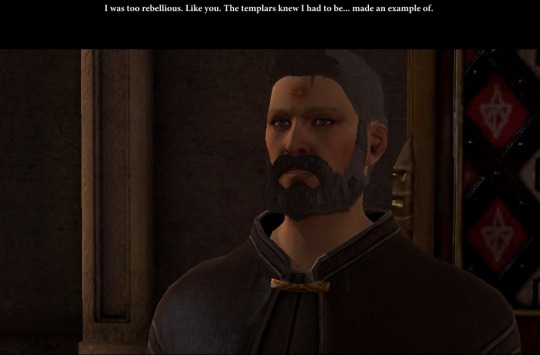
Karl: I was too rebellious. Like you. The Templars knew I had to be … made an example of.
We’ll probably never know exactly why Karl betrayed Anders. He simply isn’t around long enough for anyone to talk about it properly. And the Tranquillity itself is clearly a part of it: Karl is distressed by that state, and regards it as a kind of torture in itself. But when he asks to die, his last, desperate argument is that he cannot bear to fall back into Templar hands:

Karl: I would rather die a mage than live as a Templar puppet.
We know, indisputably, that they are beating the Tranquil in the Gallows:
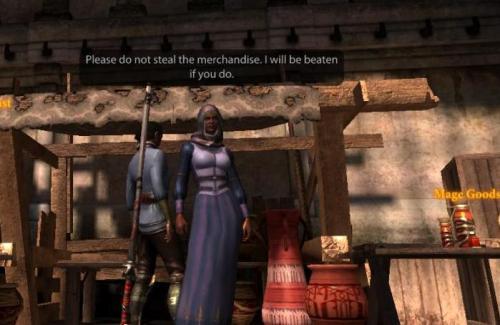
Tranquil mage: Please do not steal the merchandise. I will be beaten if you do.
There is also, disturbingly, this:
A ball of white fire soared toward him, everything she had poured into it, and when it struck him it exploded into an inferno.
He was engulfed, as were the Tranquil nearest to him. They shrieked as they lit up, trying in futility to run away.
– Dragon Age: Asunder
To be fair, these aren’t real Tranquil: they are dream Tranquil. But they are Pharamond’s dream Tranquil, and if anyone gets to decide how the Tranquil respond to pain, it’s the guy who cured his own Tranquillity.
The Chantry claims that the Tranquil don’t feel, but they also know that beatings work. Tranquil scream. And so they have fear. Not as a non-Tranquil person would experience it, no, and they certainly are not able to express it in any ‘conventional’ sense. But they have it. Avexis was hurt so badly she does not believe she would survive the cure for Tranquillity. The woman selling Circle wares in the Gallows courtyard fears being beaten for others’ crimes.
Karl has free will, as a Tranquil, but has no expectation of being able to use it. What was done to him, to make him betray his principles so thoroughly?
They do have principles. The Tranquil may not strive for anything, but they will damn well take a stand for it, when the opportunity arises. The taboo against discussing the Rite of Tranquillity is broken twice in Asunder. Once is by Pharamond, who delivers a haunting description of the experience of being Tranquil. The other is by an unnamed elven woman, who draws Rhys a bath:
She stopped and turned to look at him. “If I felt pain,” she said softly, “it is meaningless to me now. Once I knew only fear, but now I know only service. Whatever pain there was, I believe it an acceptable trade.”
The Tranquil left. Though Rhys sat in near-scalding water, he felt a chill race through his heart.
– Dragon Age: Asunder
Poor Rhys spends most of the damn novel terrified the Templars are going to either kill him or make him Tranquil. This woman knows this – he initially believed she was taking him to have the Rite performed – and talked to him because she thought he needed an answer. She spoke out of compassion. And if the answer she gave him was somewhat unsettling – well, that’s the least that could be said of being made Tranquil.
This same woman turns up again later, and provides intelligence on the Lord Seeker to Wynne, Evangeline and Shale as they go to destroy the phylacteries:
“Why are you telling us this?” she asked. I’ve never known the Tranquil to do anything but what they’re told.”
The woman tilted her head curiously, as if the answer should be obvious. “Obedience is prudent. To interpret it as a lack of free will would be an error.” She turned to leave, and then paused. “Good luck, Knight-Captain.” And with that she walked away, vanishing into the shadows.
– Dragon Age: Asunder
This is a nameless elven Tranquil mage – a person with literally no identity, and zero social status. She is the least of all people in Thedas. And she twice defies what ‘everyone knows’ about the Tranquil to aid Asunder’s protagonists. History will likely forget her, but she is remarkable all the same.
And in all of this, I cannot forget Maddox.
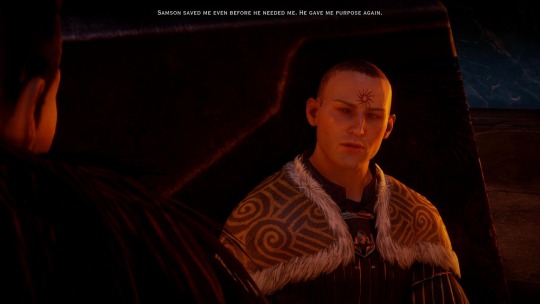
Maddox: Samson saved me even before he needed me. He gave me purpose again.
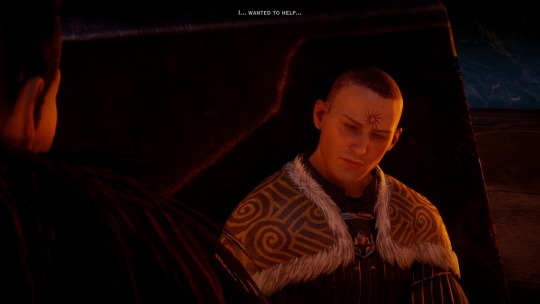
Maddox: I … wanted to help …
Maddox loved Samson. What other words could you use for it? Cullen refers to him as ‘Samson’s Tranquil’ because, frankly, Cullen has about as much humanity and compassion as the giant scorpions in the Fallout games – but the truth is that Maddox was Samson’s friend.
Yes, they are fucked up: they are the survivors of Meredith’s regime in Kirkwall, and pretty well no one got out of that shitshow in one piece. There’s no way to argue that Samson is doing the right thing here. Samson isn’t even really trying to win: at his trial he frames it all as a means of taking the Templar Order out with one last bang. And Maddox, here, emulates that: his suicide is not practical, but a tragic act of loyalty; an effort to save Samson as Samson saved him.
I can’t applaud the pair of them for running around with Corypheus, but I can’t help but compare Maddox with Genitivi:
The name is a misnomer, for they are not tranquil at all; rather, they are like inanimate objects that speak. If a table wished to sell you an enchanted penknife, it could pass as one of these people.
That genial lie. That gentle insistence that everything is fine: these are not people, and they are not hurting; it isn’t even possible to hurt them. If they are beaten and that keeps them in line, that’s nothing to be concerned about. They don’t really feel it. Even the mages give up on those of their people who are made Tranquil. Even Anders doesn’t think to fight for the Tranquil.
But look at Maddox there, who loved Samson. Tell me he’s a fucking table.
That is how the Chantry made these people slaves.
I am very sorry that Inquisition blew up the mage rebellion and flushed its remains down the toilet. I am distressed that it chose to carve out Tranquil skulls to make magical telescopes. I hope we come back to them, next time there’s a game.
It’s time these people got their place in the world back.
#Dragon Age#Dragon Age meta#the original wouldn't let me reblog#but this is too good to lose to the nether
3K notes
·
View notes
Photo
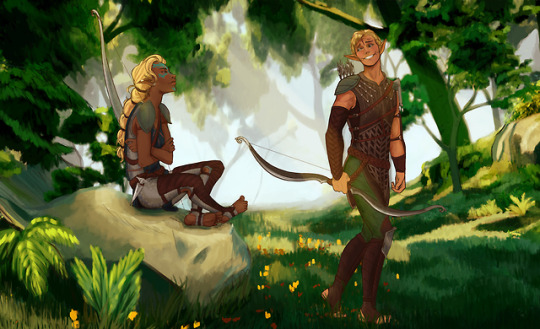


“If I brought some valuable artifact back to the keeper, maybe she would forgive me for…well…you know”
#Dragon Age#Mahariel#Tamlen#this guy#first ever playthrough#i got attached too quickly#and then the camp scene
8K notes
·
View notes
Photo
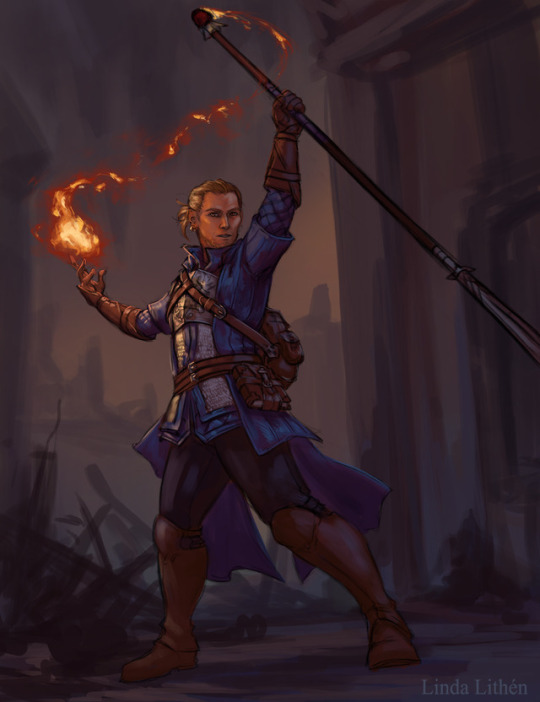
Grey Warden Anders for this week’s Patreon poll sketch :D
Continuing my “my warden is from the Circle and I can’t picture her reinforcing any sort of dresscodes outside of the general Warden colours and ‘as long as you’re protected’“ streak with the Warden characters’ gear.
#Dragon Age#Anders#Grey Wardens#i hope your patreon eventually gets you through them all#they are gorgeous#and i really want to see how the others self-style their gear
6K notes
·
View notes
Photo
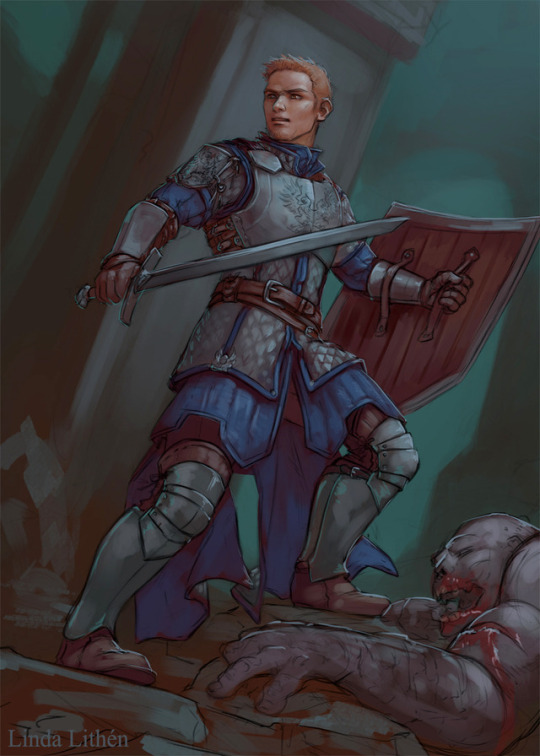
Alistair from Dragon Age for my Patreon sketchpoll :D
I dunno, I kinda enjoy the thought of the fereldan Wardens having more varied armours with personal customizations, what with them rebuilding the order there. … plus, don’t think my Warden at least would be super serious about dresscodes.
5K notes
·
View notes
Photo
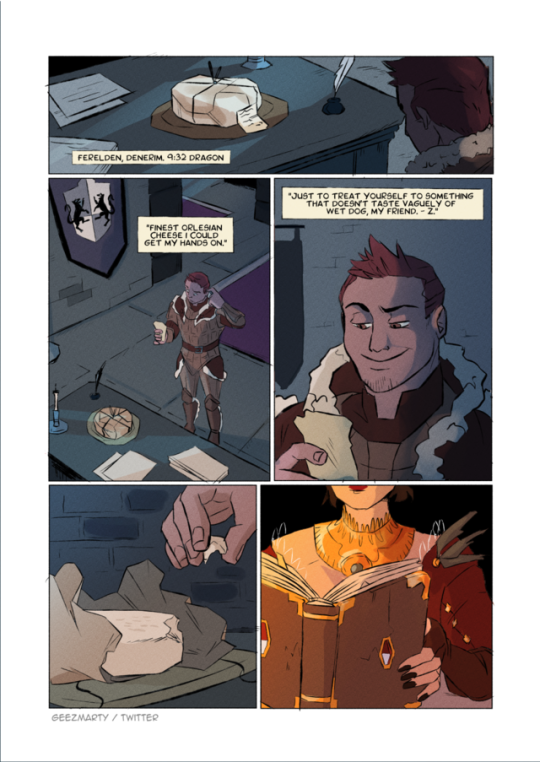
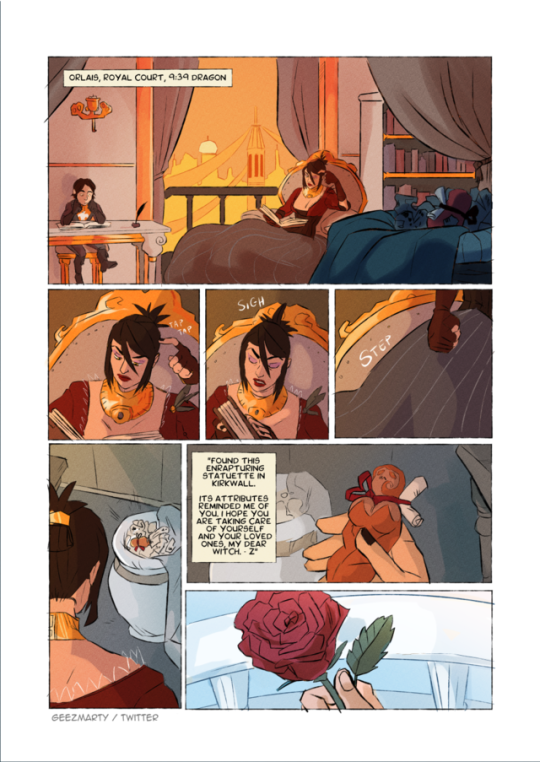
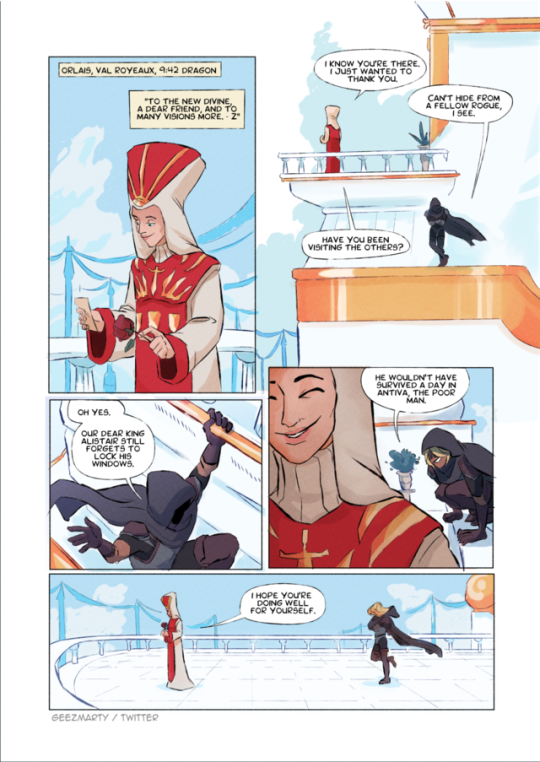
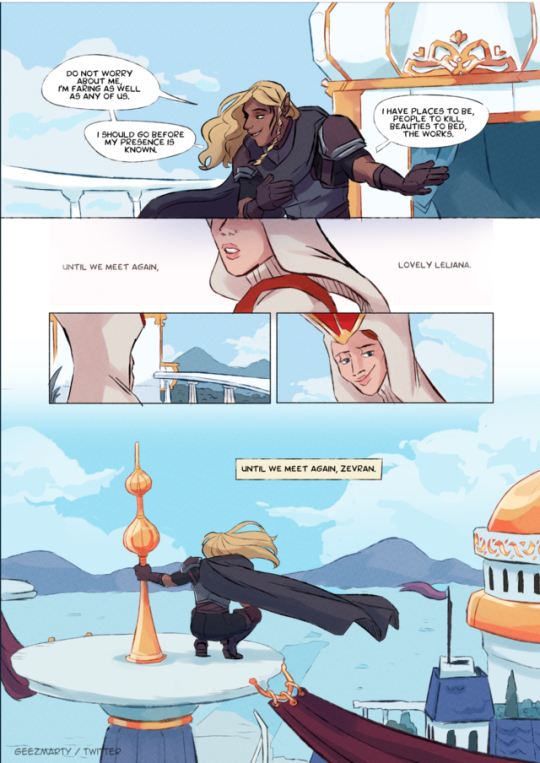
A comic about visiting friends through the years
19K notes
·
View notes
Text
So, we’ve all had mod problems, yes? Mods not working, not playing nicely, not being installed properly, etc. Anyone who’s modded games before knows funny things can and will happen. And everything worked fine in the base game, after much fudging to make things get along. But, uh, Awakening sort of broke... everything? This is one of those times where I wish I had video capture or something, because I couldn’t replicate it when I tried.
Like, the first time entering the Vigil’s courtyard, no darkspawn. Ok, I thought, something’s amiss but may it’ll be okay! The NPC merchant does nothing. Get to the wooden gate, still no darkspawn. Do I just, walk through? The closed gate? That’s not how I remember it going, but alright. Through the gate to the invisible voice yelling for bandages.
Uh... let’s just, go into the Vigil proper Mhairi.
Onward to meet Anders! ... who immediately yeets himself through the wall and into the Void. Well that’s a little more concerning. Find the survivors - no darkspawn. Onto the battlements - no darkspawn. Pull the lever, Kronk! - no darkspawn, but apparently Dworkin has invented jet bombs, because all I have is a pair of naked legs sticking out from the top of the screen.
Let’s just go find Oghren.
More survivors - no darkspawn. Oghren! Oghren. Oghren, where’s your cutscene. Oghren, the door won’t unlock until we’ve had your post-cutscene fight. Oghren, I need that cutscene.
You know what? Mhairi, wait here, I want to check something.
Let’s go back to base game, maybe I had a bad last save. Everything seemed fine la --- where’s the Archdemon? Sandal, I just left you what are you doing on the rooftop, there’s a soldier being squished to death by invisibility, w-why are all the darkspawn gone, I literally saved Denerim an hour ago, Awakening what have you done to my save files?!
Needless to say, after a clean install my save files worked fine again, and Awakening had no problems with mods a second time apart from a few invisibodies because ID conflicts are great.
#Dragon Age#Dragon Age modding#because modding is 'fun'#and no issues ever happen#i laugh about it now#it's funny now#the me of yesterday would be inclinded to disagree
2 notes
·
View notes
Text
Asexuality and Romance
And Solavellan
Hi, hello, it’s Allison again and this week on “Things I would Very Much Like to See Less Of,” I will be addressing the notion that asexual relationships are less meaningful and/or important, than sexual relationships. I recently took to twitter with my thoughts on how relationships do not require sex to be considered a romance, citing Solavellan as a specific example. I was pleased with the supportive responses I received; however, there was a pattern of responses that did bother me just a little.
“It is impossible to imagine Solavellan as asexual because it is too [intimate/ passionate/ deep//romantic/ etcetera} to be asexual.”
Or
“Solas is too flirty and suggestive to be asexual or exist within an asexual relationship”
These comments were well-meaning, and in completely good faith, however, they are ultimately acephobic, as they suggest that people who identify as asexual or who exist somewhere on the asexual spectrum cannot have intimate, passionate, deep, romantic relationships with others, or that they must be prudish saints to be considered ace. This is not only hurtful. It’s just wrong. For several reasons!
I’m gonna just slip those reasons behind a read more to be mindful of others’ feeds.
Keep reading
655 notes
·
View notes
Note
I have to disagree with you on the Chantry post. They help people, there's dialogue about the sisters going out and praying with people and welcoming disadvantaged people into their church.
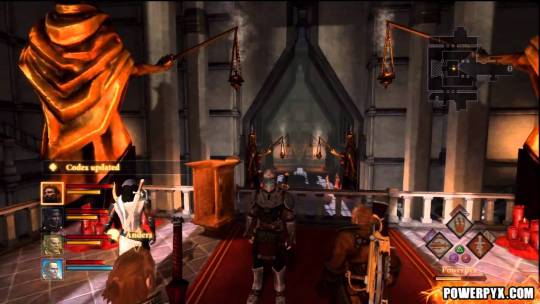

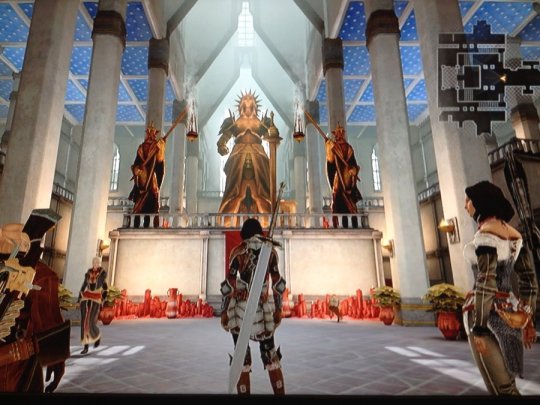

2K notes
·
View notes
Photo



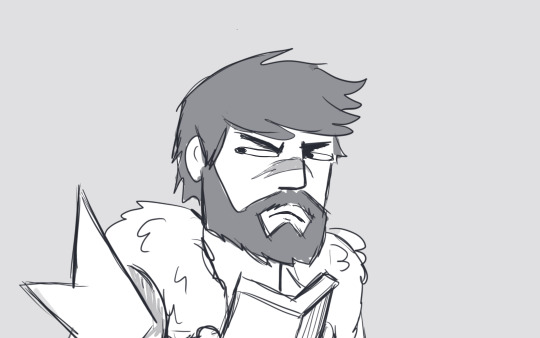
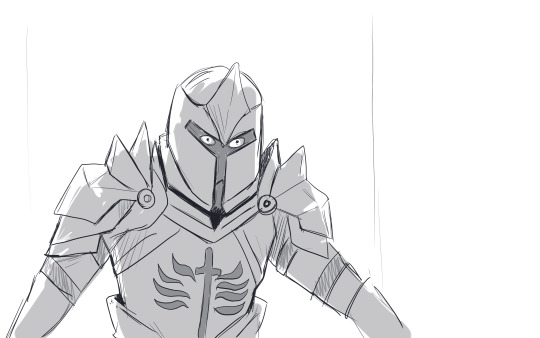
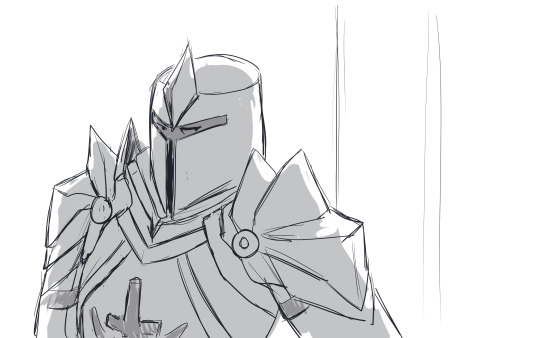
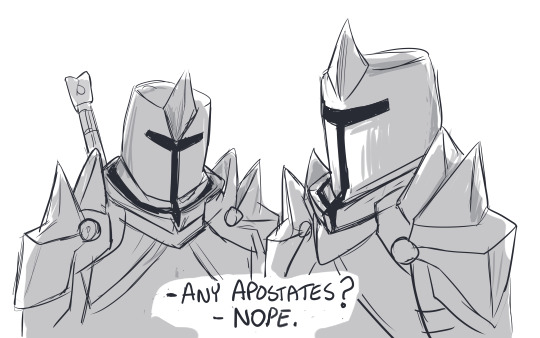
First thing I thought of when I saw these Batman screenshots. Probably funnier in my head. *shrugs*
11K notes
·
View notes
Text
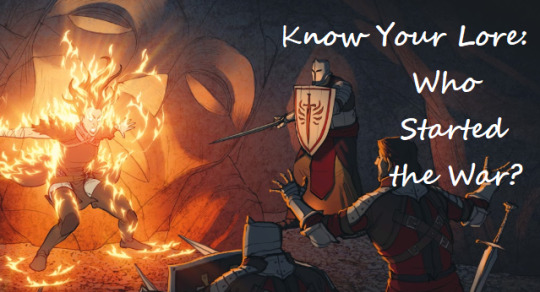
The Mage-Templar War was a long time coming. When our Herald’s of Andraste stumble upon their fate, it’s during the Conclave which was called together because of the war.
Mages and templars were fighting each other, causing many casualties and great destruction of the lands of Thedas. And, while the history of how this war came to be is clearly depicted in the extracurricular media Asunder, it isn’t so easy to understand for those who simply played Inquisition.
This is part seven of a seven part series on Anders
Contrary to what the majority of people seem to believe, Anders did not start the Mage-Templar War. In 9:37 Dragon when he destroyed the Kirkwall Chantry, he directly started the Kirkwall Rebellion. This was an event isolated to Kirkwall in which the mages rose up to fight the templars after Meredith sought to murder hundreds of thousands of them for one man’s action.
The war itself did not start until three years later in 9:40 Dragon. Kirkwall may have been a stepping stone, but it was simply one small piece that got the groups to this point.
It’s important to remember that Kirkwall wasn’t the first in this century to rise up. In Inquisition, Hawke tells us that Kirkwall wasn’t the first. And we even see that during our time as the Hero of Ferelden.

(Source: World of Thedas)
Senior Enchanter Ultred of Kinloch Hold tries to start a revolt in Ferelden during the blight, but it unsuccessful.
After Kirkwall, news does spread to other parts of Thedas. There is significant unrest in other Circles as well as within the Chantry itself. The leader of the Seekers at the time of the explosion was Lady Seeker Nicoline. Likely feeling partially responsible for not stepping in before Kirkwall, she stepped down from her position, much to the distaste of Justinia V, and passed her position to Lord Seeker Lambert.

(Source: World of Thedas)
In 9:38 Dragon, Lambert took it upon himself to close the College of Enchanters, and it is believed that this was done intentionally to stop Grand Enchanter Fiona from calling the mages to vote for their own independence.
The various Circles felt the increased tension from all sides. In Orlais’ White Spire Circle, a spirit inhabiting the body of Cole, the mage who starved to death in the Spire’s prison, was believed to be by some a ghost or possibly templars murdering mages due to increased tensions. A mage named Rhys tried to investigate the situation, but he was called to join his mother, Wynne, alongside Shale, his friend Adrian, and a templar named Evangeline to find a man named Pharamond.
When Wynne, Rhys, and the others find Pharamond, it is discovered that Pharamond was an elven mage who had been made Tranquil. Divine Justina V herself had allowed him to experiment, and he was able to successfully reverse his own Tranquility. They returned to let the Divine know of his success, but she ordered for him to be made Tranquil again, noting that he was made Tranquil for a reason in the first place and that the way he reversed the Tranquility involved the use of spirits and demons. Pharamond was murdered before he could relive this terrible fate.
Lambert grew more and more angry with the situation. He was disgusted at Justinia’s sympathy for the mages’ goal of independence. And he was increasingly fearful that it would come to light that the leaders of Seekers of Truth had known that there was a reversal for the Rite of Tranquility. After all, a Seeker gains their powers from being made Tranquil and then having their minds touched by a spirit.
In 9:40 Dragon, Lambert made his way to the White Spire to take over. As the unrest grew to a boiling point, a number of first enchanters came together to resist and decide what to do. Lambert ordered an attack against him, and the first enchanters, along with a number of other mages and a few others fled to Andoral’s Reach.
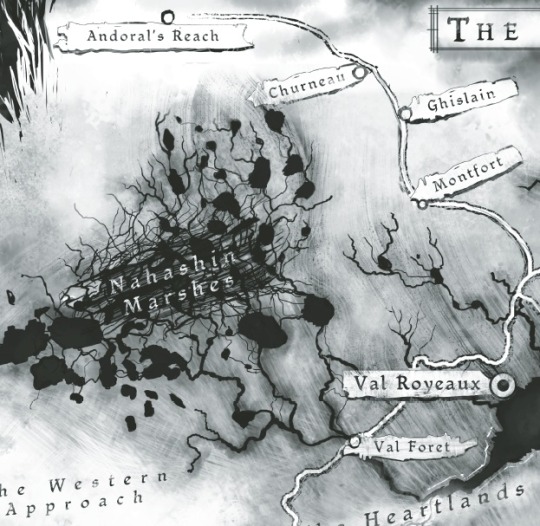
There, the mages voted. The Loyalists and Libertarians voted true to their names - to stay under Chantry rule and to leave it, respectively. The moderate Aequitarians, headed by Rhys after he took over his mother’s position, voted for independence as well.
It should be noted that voting for independence did not automatically mean going to war. It very could have easily meant for further peace talks. But Lambert decided that he would not leave this to chance.

(Source: World of Thedas)
So the war broke out in 9:40 Dragon, three years after the Kirkwall Chantry crumbled to the ground. Anders, certainly, was a catalyst for the situation, but he cannot be blamed for starting what Lambert demanded.
It is greatly disappointing that this information isn’t more obvious in the game. For those who discover the world of Dragon Age through its later installments, this information being danced around leads to a generation of players who know little about Anders or the situation surrounding the mage unrest. That’s why it’s of the utmost importance to make sure that factual information is shared. People deserve to know what really happened. And Anders deserves not to have his character further dragged through the gutter.
No one has to like or dislike certain characters, Anders included. He’s a complicated character with flaws upon flaws. But he is also smart, talented, deeply loyal, and deserving of far more than he’s gotten from fans and creators alike. At the very least, understanding him, his motivations, and the actual history of the war is all that can be asked.
#Dragon Age#Dragon Age meta#Anders#this series is a masterclass#in being factual with respect#thank you for sharing
173 notes
·
View notes
Text

When Anders destroyed the Kirkwall Chantry, it’s said that approximately 100 people died directly from that explosion. Some of those people weren’t necessarily innocent. Grand Cleric Elthina’s inaction certainly makes her as culpable to the situation as anyone else in the matter, and the other Chantry members and the templars were part of an oppressive organization. But, absolutely, innocent lives were lost that night in order to potentially save the lives of hundreds of thousands.
The loss of these lives, both innocent and not, is often the reason that people take issue with Anders’ action. Even those who like Anders or support mage freedom cite this as their reason for their distaste.
However, if we’re going to use “killing innocents” as our reason for disliking characters in Dragon Age, we need to put down our mice or controllers and step away from this world entirely.
This is part six of a seven part series on Anders
I want to make it abundantly clear that I love just about every companion in the world of Dragon Age, and I like almost every other character, at the very least for their complexity or unique perspectives. The intention of this post is in no way to say that I dislike certain characters, and it does not say that I agree or disagree with their given actions or inaction. But it is important that “killing innocents” is looked at with an objective eye to gain perspective on whether or not it is a valid reason to dislike a character in this series.
Before we delve into other characters besides Anders, we should keep a few things in mind.
Varric: Oh, cheer up, Blondie. You’re making me cry just looking at you.
Anders: Don’t.
Varric: You made a mistake. It happens.
Anders: I almost killed a girl.
Varric: You’ve killed two-hundred and fifty four by my last count. Plus about five hundred men, a few spiders, and at least two demons.
Anders: It’s not the same.
Varric: Why? Because this one you feel bad about? Maybe that’s the problem.
This conversation takes place in 9:34 Dragon, so, at this point, Hawke and their crew has been working together for upwards of three years. Bear in mind that Anders is one of the few companions who actually keeps a day job (helping and saving lives) and isn’t necessarily going to be going around with Hawke as often as other jobless companions. Also keep in mind that Anders’ main talents are in spirit healing meaning that he is largely in a supportive role where he heals more than he kills. Therefore, it’s extremely safe to say that this death-toll placed on him would be significantly lower than any associated toll placed on other companions.
Absolutely there’s reason to believe that most people killed by our protagonists and their companions are bad guys and not innocents. But it’s naive to think that there aren’t plenty of innocents who get caught up in the madness.
This is highlighted well during the introduction by Varric to the comic “Until We Sleep”.
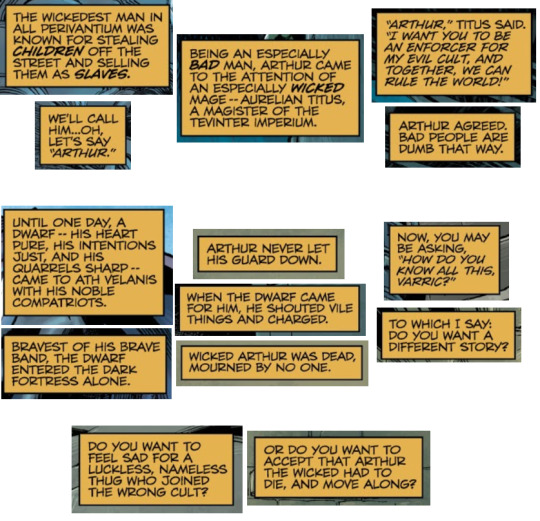
Varric makes up a backstory for a young cult member he dubs “Arthur” as he retells the tale of murdering him. In the library edition of the comics, script writer Alexander Freed notes:
“The story of ‘Arthur’ is one of my favorite minor sequences. It tells us something about Varric and it delivers plot information - and it’s also a reminder that our heroes kill an awful lot of people during these series and cope with it in their own ways.”
While there’s not enough time in the world to go through every single character in the Dragon Age universe, we should highlight a few who manage to kill innocents. Note that not all of them have reasons as just as Anders does.
When Hawke comes to Kirkwall, they’re forced to work for an entire year in order to repay the debt that incurs from being allowed into the city-state. They get to pick between smuggling and mercenary work. If your Hawke was a merc, they very likely spent that year as a hired sword (or dagger or bow or staff) basically killing anyone they’re told to for the group’s profit.
Fenris, after escaping his master Danarius, finds himself a home among the Fog Warriors of Seheron. When Danarius finds him, he orders Fenris to kill them. Unfortunately unable to break from the trauma and brainwashing of slavery, Fenris does as he is told and murders the warriors. Of course this prompts him to escape once again, but innocent lives were still lost.
Merrill’s desire to restore her eluvian is so great that, when she refuses to let go, the result is the death of Keeper Marethari. Unless Hawke belittles her, the clan retaliates over the loss of their Keeper. Every one of them is killed by Merrill, Hawke, and their other two companions in the end.
When Isabela steals the Tome of Koslun, the Arishok and his band of Qunari take up residence in the Docks. After years of growing tension over their continued presence and the conversion of Kirkwall citizens to the Qun, quarrel breaks out. This results in a significant number of deaths on both sides including Viscount Dumar and sometimes even the Arishok. Had Isabela returned the book (earlier or at all), potentially everything regarding that could have been avoided.
Before we discuss Isabela any further, I need to reiterate that I love these characters, her included. I think how her past was handled in the comics was extremely disheartening, but I’m adding this in because it is important to the point.
The reason Isabela stole the Tome of Koslun in the first place is because she needed something to repay the debt she incurred after this incident. A ship she shared was carrying slaves. When the Orlesian Navy found them, they needed to get away because Orlesians kill slavers. In order to gain speed, they decided to make the ship lighter by dumping cargo - the slaves.
(I removed the images from the comic “Those Who Speak” that gives context to this. It should be noted that this is for BioWare’s canon, and it was wrong of them to have a black woman have anything to do with harboring or harming slaves. BioWare’s canon does not supersede personal canon, but I am using in-canon evidence for this series even when it is outrageous such as this.)
Of course, it’s not just our second game companions who have killed their share of innocents. Imagine how many lives must have been lost on a contract kill from Zevran. Oghren killed his fair share in the Provings. Velanna’s hatred of humans surely meant some innocents died. We know about what Blackwall has done. Solas’ actions resulted in the entire downfall of his own people.
And we shouldn’t forget this dialogue either:
Inquisitor: I don’t kill that many people.
Dorian: You’re joking, right? I’m surprised you didn’t kill someone on your way over.
The fact of the matter is that Dragon Age is full of death. Often it’s focused on true evils like darkspawn, demons, or cult fanatics. But just about every character we hold near and dear to our hearts has ended the lives of thousands, many of which would be considered innocents by some.
We don’t need to condone murder to like a character. We don’t even need to like that there are lives lost. We need an understanding that they are all perfectly imperfect and do things that make us question our own morals. And we need to judge them evenly. Because if one character killing people is a problem, how can we be ok with all of the other characters?
If one character killing people is a problem, we need to pick another game to play.
Up next: Know Your Lore: Who Started the War?
225 notes
·
View notes
Text
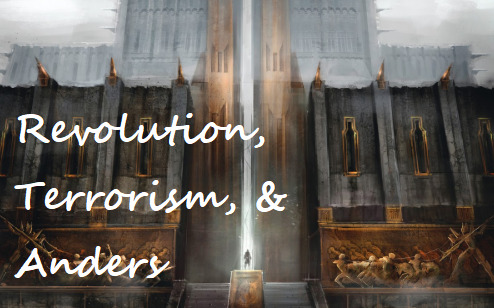
In 9:37 Dragon, tensions are boiling in the city-state of Kirkwall. While mages had already felt oppression beaten down upon them for nearly 1000 years, those who reside within the jet stone walls of the Gallows are being tortured and being made Tranquil illegally. Knight-Commander Meredith has sent to Val Royeaux to ask for the Rite of Annulment for the Gallows.
She has asked for permission to murder every single mage under her charge.
Anders acts, and he goes for the real problem - the Chantry. It explodes. Some people die. And the mages of Kirkwall are given the opportunity to fight rather than being murdered while they sleep.
This is part five of a seven part series on Anders
Whether the game was written with this intention or not, Anders’ action that night in Kirkwall tends to anger people. In our post-9/11 world, we’ve been conditioned to see things like explosions and become instantly upset and critical. It doesn’t matter the reasoning. It doesn’t matter the motivation. It doesn’t matter the net positive that might come with it. If you do something big and people get hurt, we are hard-wired and socially conditioned to jump to the conclusion that it is 100% wrong.
But our world isn’t that simple. And neither is the world of Thedas.
The term “terrorism” is completely and utterly inappropriate to use concerning Thedas, a Medieval-eque world, because it’s a modern, geopolitical buzzword.
The word “terrorism” was used quite differently than we use it today when it was first coined in the 1700s, and, even now, no one agrees on a proper definition for it. What we do know is that the use of the word has gone from “a government organization causing terror and anxiety” all the way up to seemingly “anything I personally deem bad enough that causes fear and anxiety”. Using modern thought on that word would rewrite history as nearly ever major event of change being brought about through terrorism.
The word is so strong that it, in itself, causes anxiety. It is such a strong word that it completely shuts down a conversation before it can even happen. It is such a strong word that people either do not question motive at all or they feel that any motive cannot be good enough to explain why an act can be anything but wrong.
However, motive is everything.










As we’ve seen in previous installments of this series, the mages had been oppressed, ripped away from their families, imprisoned, beaten, made illegally Tranquil, raped, and murdered. The worst was happening in Kirkwall, and it was continuously getting worse. Anders tried for over 6 years to peacefully protest in between running a free clinic for those not helped by the Chantry, helping the Mage Underground, and running around with Hawke. Meredith had asked to kill all the mages. Elthina stood idly by. And Anders knew he could either let every mage die or act.
Fighting back against a genocidal organization for the betterment of an oppressed people is admirable and justifiable.
When our own governments or selfless citizens step in against horrors existing in our world, we applaud them. As much as we wish casualties didn’t happen, logic dictates that it can and will happen. It is a horrible moral dilemma that no one wishes to be placed in. No one wants to decide “do I save these many people if it costs a few lives”. It’s unfathomable to even put yourself in a mental place to think about making that sort of decision.
But for the people who have to make those decisions, we don’t mark them as terrorists. We look back on them realize they were revolutionaries. They fought civil and world wars to free people who couldn’t free themselves. They did what they did to help people, and not for their own personal gain.
Anders is a freedom fighter. He’s an insurrectionist.
He makes this horribly difficult decision when he sees no viable alternative, and he knows he will be hated for it. He expects to be killed for it. But his motives, whether one agrees with the decision or not, are good and for the good of the mages.
Unfortunately, that’s another part of the narrative that’s handed to us. It at least feels as though we’ve been presented a story of fighting against oppression, but that actually fighting back is inappropriate. Dragon Age, after Kirkwall, is painted in this way of “well the mages had it bad, but they could have just…not done that.” They want us to believe that “violence is never the answer.”
Yet how can we be presented a tale of desperation and revolution without action? And how much longer can you kick a dog and expect him not to bite back?
937 years had been more than enough time for change to come on its own accord. 937 years was enough time for the powers at be to realize that the genocide of the elves was wrong, and that imprisoning an entire group of people was wrong. 937 years was enough for someone to step in at all.
Justinia V was getting there. But she knew what was happening in Kirkwall. She sent Sister Nightingale to see just how bad things were and even warned Elthina to leave because she knew something would happen. But perhaps she could have jumped to action. The Seekers of Truth could have been sent in quicker, but they had their own demons that they didn’t want uncovered.
Meredith’s madness was growing so out of control that she would have killed every mage whether she had permission to or not. As we’ve seen, she managed to keep herself in control, and she got the things she wanted. The lyrium idol would only help her achieve it. And we should consider just how many mages would be slaughtered.
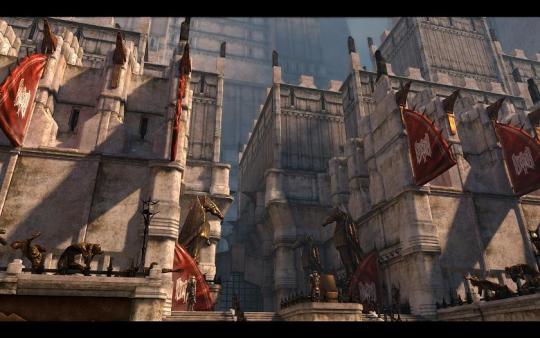
Kirkwall’s Circle, the Gallows, is the largest Circle in all of Thedas. Though we don’t have an accurate headcount for the mages living inside or even the population of Kirkwall, we do know from Brother Genitivi’s published works that Emerius (Kirkwall’s name while under the Imperium) held nearly 1 million slaves at one point in addition to however many Tevinters lived there.
Given that number, it is easy to say that there were likely hundreds of thousands of mages locked within the Gallows’ walls.
Let us now consider the casualties of the Kirkwall Chantry explosion. From the game, we see approximately 6 people die within the Chantry (Elthina, a few Sisters, and 2 templars). That being said, Mary Kirby has confirmed that Anders did not contain the blast from the explosion. The rubble was enough to rain over the city-state, and, considering that the entire back of the Chantry was against the Waking Sea, much of the rubble fell into it and changed tide patterns for years. It is the most ludicrously animated explosion one could imagine (and one would wonder why they wouldn’t just…do it the normal way to make it seem not contained, but that’s retconning for you).
The real facts we have to go by are from Varric and Sebastian during Dragon Age Inquisition.
Blackwall: I once met a dwarf who made the best home-brewed ale.
Varric: I once met a Grey Warden who got possessed by a spirit and then blew up a chantry and killed a hundred people.
Varric: What makes people think you want to hear what others of “your kind” have done?
The Wartable mission Annexing Kirkwall reads as follows:
“The worst of the mage rebellion is now past. However, the mage who started it all, who destroyed the Chantry in Kirkwall and murdered Grand Cleric Elthina and dozens of the innocent faithful, is still at large. The fanatic Anders must be brought to justice. Though he may no longer be in the city, it is still home to many of his known associates. I thus resolved to invade Kirkwall to locate Anders…”
At worst, we’re hearing that 100 people died from a man who makes his living by lying and exaggerating. Sebastian has absolutely no reason to lie about this matter. But let’s just give everyone the benefit of the doubt and say that Anders blowing up the Chantry directly ended the lives of 100 people.
100 Chantry members (who were part of the system that has oppressed mages for 937 years) and the nobility in Hightown vs. potentially hundreds of thousands of innocent mages in the Gallows. That is what Anders had to decide between.
It is deeply unfortunate that any lives were lost at all. Considering that Anders has dedicated his life to protecting the innocent, treating the sick, healing the wounded, and delivering babies, you should understand whole-heartedly that Anders would have taken any other route if he believed any other option would result in the mages having a fighting chance.
But the only two choices were act or don’t act.
Anders could have very easily stood back and continued his life helping Hawke or potentially being in a relationship with Hawke. But he and Justice knew exactly what not acting would mean. Don’t act means that potentially hundreds of thousands of mages would die by Meredith’s hands. Mages who had been ripped from their parents as children (as young as six in the case of Emile de Launcet) and thrown into a prison would be murdered for a crime of birth. Likely nothing would change. It would all be swept under the rug and deemed as ‘necessary,’ and mages would continue to be treated the same. He would never be able to live with himself if he let that happen. Quite frankly, I find it hard to imagine that most anyone would fail to act when something so dire was about to happen, but we’ve got Elthina as proof of that.
Acting was easy because he knew the alternative. He knew it would be hard, but he knew it would be right. You have to go after the problem. You have to go after the Chantry. It wasn’t enough to just quietly kill Elthina. A statement had to be made that enough was enough. He also couldn’t have just gone after Meredith. She was far too strong to go after on his own, and Anders would not have had the support from the rest of the group to launch an impromptu attack on her without implicating them. Considering that he hides his intentions and keeps it from his own partner, we know that Anders wanted to claim sole responsibility for calling the mages to rise up.
Anders did what he felt had to be done. He saved potentially hundreds of thousands of lives, and he helped the mages realize that enough was enough. His actions were not without consequence, but they were done for the greater good when he knew the alternative was far more horrific than he could live with.
Revolutions are what change our history, and we look back on those changes typically with admiration, respect, and an understanding of their cost. Worlds can not be expected to be made better by those who stand idly by. Anders knew that. And his action and his legacy deserves to be understood as such.
Up next: Anders Killed Innocents (and so did everyone else)
194 notes
·
View notes
Text

Kirkwall, formerly Emerius, is a city-state that was once under the flag of the Tevinter Imperium. It was specially designed to keep the Veil thin, likely aiding the ancient magisters to better achieve their goals of mining jet stone and trading slaves. It is said that this thinning of the Veil lends Kirkwall to a greater risk of demons and blood magic compared to many other places, and many are quick to blame the problems of this Marcher state on this fact.
However, there were many things other than the thin Veil that led to Kirkwall becoming the epicenter for rebellion.
This is part four of a seven part series on Anders

Kirkwall has a leadership issue. Though the formal head sits with the Viscount, the other leaders of the city are often at odds with each other, and the checking system doesn’t always follow through with settling disputes.
One of the most notable leaders of the city is Knight-Commander Meredith. Like many templars, Meredith joined the Order because she wanted to help. She had faced an extremely traumatic experience concerning her own mage sister. Even back then, it was well known that a child sent away to the Circle was a horrible thing, so her sister was hidden away. Without training or nurturing, her sister was unable to control herself when the templars finally came for her. Their mother and dozens more were killed, and Meredith vowed to keep this from happening again. The templars took Meredith to the Gallows, and she started to train under the Kirkwall Chantry.
Just like with many templars, these goals for helping often become corrupted by hatred and even lust for power. When she ranks up to the level of knight-captain, Meredith proposes changes and greater order impressed upon the mages.
It is safe to assume that these changes for greater order brought about increased hostility both to and from those forced to live inside the Gallows. This is seen through Orsino’s experience while being raised and trained there.
While the timelines aren’t exactly clear, we know that Orsino becomes the First Enchanter in 9:28 Dragon, 8 years after Meredith takes her title as Knight-Commander. This would lend itself to the assumption that he may have known Maud during this time. Maud, his closest friend, suffered so greatly by the hands of the templars that she took her own life. More and more mages committed suicide due to the horrors they faced. And this led Orsino to want to rise through the ranks to try to help his fellow mages.
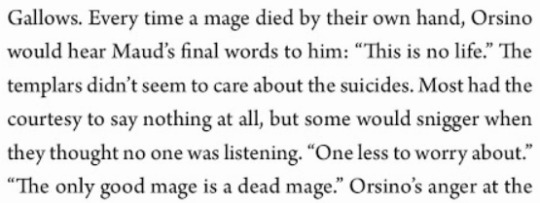
(Source: World of Thedas)
In 9:20 Dragon, the same year that Meredith achieves her highest title, Viscount Threnhold of Kirkwall is overthrown for his own shady dealing. Meredith helps to take him down, and she helps to appoint Marlowe Dumar as his successor. Dumar never appears to be an active leader. That can likely be attributed to the fact that he felt deeply threaten by Meredith considering this is how she handled him taking the Viscount position:
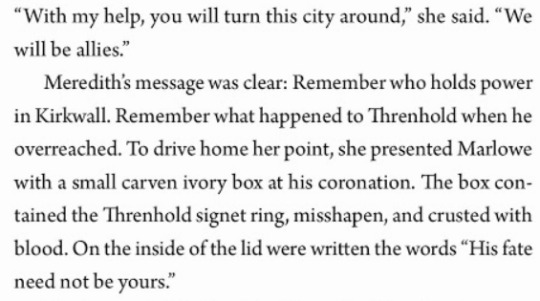

(Source: World of Thedas)
During Meredith’s time as Knight-Commander, the treatment of mages in the Gallows continued to get worse. She actively allowed hatred and abuse. She groomed Cullen’s own hatred of mages into what she believed would be her perfect Knight-Captain. Any templar showing any sympathy at all towards the mages were punished. Samson was kicked out of the Order for passing love letters between mage lovers.
Though using the Rite of Tranquility is illegal on a mage who has passed their Harrowing (with the exception being extreme circumstances that must be approved by the First-Enchanter only), more and more Harrowed mages, and even mages denied their Harrowings, turn up as Tranquils in the Gallows and the courtyard.

Karl was made Tranquil because he was sending letters out of the Gallows to his former friend and lover, Anders.



Even though Meredith was not necessarily directly responsible for performing the Tranquilities and despite her shutting down Ser Alrik’s Tranquil Solution, it was no secret that these mages and more were being made illegally Tranquil. Considering that Orsino would have to approve of the Tranquilities, it is hard to believe that these were taking place with him knowing at all. The templars were knowingly breaking rules, and Meredith allowed it. Lobotomies, rapes, tortures, even murders kept happening.
Meredith, nor her charges, nor the Viscount, nor Grand Clereic Elthina did anything to actively keep these mages safe.
Elthina was orphaned north of Kirkwall in a small town up in the Vimmark Mountains. She was given to a Chantry, pledged herself to the Maker, and later moved to Kirkwall where she became a revered mother. It was near her fiftieth year that she got her title as Grand Cleric, and she was known for her mild-manner and stolid demeanor. Rather than push people towards something, faith included, she preferred to note that “they will come to it in their own time.”
Her attitude extended towards the troubles of the rest of the city as well, despite that being against her job description. As tensions grew between Meredith and Orsino - the templars and the mages - Elthina stood by, preferring to let things play out as they would despite knowing just how bad it was for the mages of Kirkwall.

“I feel for the mages, I do. I would not wish to be locked in the Gallows.”
She preferred to stand apathetic and seem “neutral” to a group of people she knew were being abused and exploited. Something telling was recently discovered by @dalishious
Elthina has very different responses when Hawke and Anders come to her about Ser Alrik’s Tranquil Solution depending on whether or not he has been confronted or not.
If Alrik is alive prior to talking to Elthina, she claims that his Tranquil Solution was simply rumor around the Gallows but would never be supported by the Chantry.
However, if he’s been killed and Elthina is brought his papers describing his plan, she claims that she knew about it and that they turned him down.
The timeline between the action of knowing what he’s doing and killing him is so short for Hawke and their crew that there’s no way that Elthina wasn’t already aware of the situation. She finds it better to ignore the warning signs of a fallout to save face, once again refusing to publicly pick sides while it is clear that she has decided the fate of the mages.

“But I cannot take sides. We are all the Maker’s creatures, but magic allows abuses beyond the scope of mortals.”
Once again, Elthina lied to Hawke. She could take sides. In fact, it’s her job to take sides when necessary. She absolutely had the power to step in, but she refused to do so.
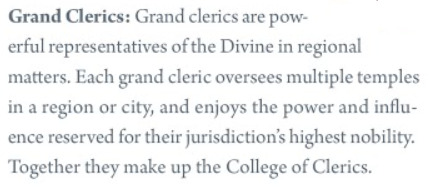
Ultimately, Elthina’s inaction made her an accessory to the horrible crimes taking place inside of the Gallows.
After Viscount Dumar was murdered by the Arishok, Meredith stalled for three years, not allowing another person to take up the seat in Hightown. Once again, Elthina refused to step in. Meredith just about had control of the city which she has clearly wanted for years. She was seemingly unstoppable, and everyone knew it. The nobles were scared. The mages felt helpless.

Meredith’s hatred escalated and her madness, partially in thanks to a red lyrium idol, pushed her to the brink. Her paranoia was such that it scared some of her charges while encourages others. Convinced that the only way to purge Kirkwall of evil is to destroy the mages, she sent off to the Divine, asking for permission to perform the Rite of Annulment. This was not a fact that she kept private as Ser Karrass was joyfully talking about it in the Gallows courtyard:


Anders, who has peacefully protested for upwards of 6 years, who has tried to be granted an audience by those who can make change, realized that he had to act. When the Chantry explodes, Anders proclaimed that he had removed the chance for compromise. But it is easily argued that the Chantry and those in Kirkwall would have never allowed a chance for compromise even so.
Something so telling about Meredith is that she, without permission, does call for the Rite of Annulment after Anders destroys the Chantry. Rather than simply punish the person involved, she takes it upon herself to blame the entire population. A mage destroyed it, so therefore all should be killed. It didn’t even matter that Anders destroyed the Chantry using means anyone could use as magic was not involved in the explosives. She saw an opportunity, so she took it.
Meredith was a woman who got what she wanted. She rose to power off of her own gumption and by trampling on the backs of weaker men. She kept Kirkwall in her iron fist while Elthina refused to do her job and protect potentially hundreds of thousands of mages within the walls of the Gallows. Without action, there can be no reasonable doubt that Meredith would have murdered every single mage under her watch, and Elthina would have called it the Maker’s will.
Kirkwall would have exploded whether Anders was there or not.
Up next: Revolution, Terrorism, and Anders
321 notes
·
View notes
Text
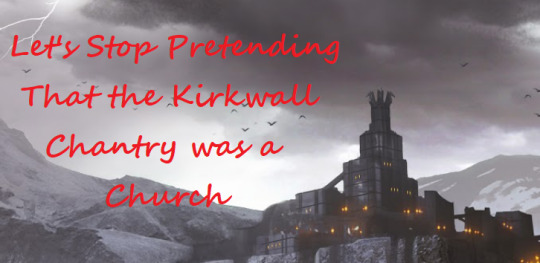
When most people think of the word “church,” people think of doing good works, helping the poor and the needy, and bringing hope to those who need it most. For others, the term has a more negative connotation, but there is at least the understanding of what a church is supposed to be.
As we’ve discovered previously, the Chantry is far more than a religious institution. And we should be apt to realize that the Kirkwall Chantry can’t claim just about any of the positive qualities that it’s supposed to.
This is part three of a seven part series on Anders
We should start by looking at other Chantries around Thedas. We are going to skip that in Val Royeaux as it is where the Sunburst Throne sits and Orelsians do things…well, in a very Orlesian way. But let’s consider a typical Chantry. Those that we discover in Denerim, Redcliffe, Lothering, and Haven.
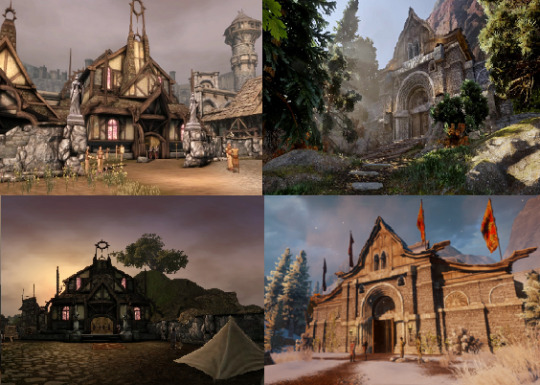
These are all reasonable, modest buildings that are used as places of worship and refuge.
Now consider the Chantry of Kirkwall:
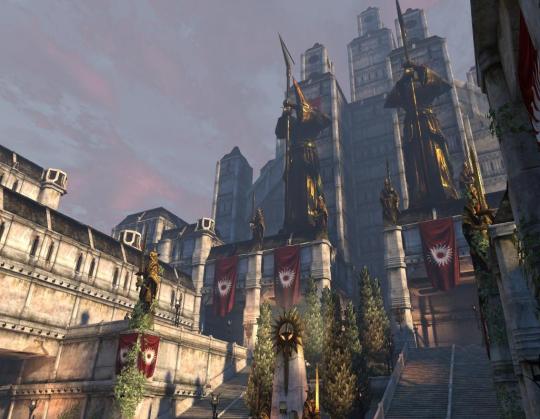
This is a massive building that towers over the richest district in Kirkwall, complete with multiple gilded statues both in and outside of the building. It’s a stark contrast from the small pious buildings Chantries usually inhabit.
One might argue that it was Tevinter’s fault for this considering that Kirkwall, once called Emerius, was built by Imperium as a hub for their slave trade and as a quarry for jet stone. They were the ones who built the building, but it was rebuilt once the city-state had changed hands and was officially considered to be occupied by Andrastians. There was an entire city-state with all sorts of buildings in multiple districts, but they picked one of grandeur and excess and made it into this.
This might imply that the Kirkwall Chantry has great wealth, and, therefore, the ability and resources to help more souls than in some other nations. However, we see no evidence of that during our time in Kirkwall.
When Hawke arrives in 9:31 Dragon, Kirkwall is full to the brim with refugees fleeing from the aftermath of the Fifth Blight. The city guard does their best to keep order, but they have to turn away many desperate Fereldans. Once Hawke is granted entrance into the city, we see just how bad off the refugees are. They’re starving, impoverished, and the only way they get any help is through independent providers such as Lirene and Anders.
The best we ever see of any single Chantry official is a Sister inside of the Chantry who says, through ambient dialogue, “There are still many refugees that need help. We all must do our part.”
What we do see is atrocious.
The following four screenshots were taken by @essiefied who has a deactivated blog. If you know their current blog or are them, please let me know so I can give proper credit.
In Lowtown, we see a Chantry Sister who is actually soliciting a poor beggar or refugee for money for the Chantry:
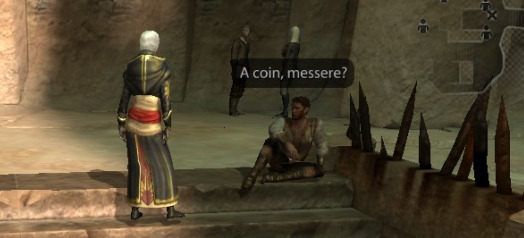

And here we have the same sister asking a prostitute, someone likely doing their job out of serious necessity, for money for the Chantry as well:


While in Darktown, where the poorest of the poor live, we have this ambient dialogue:

Another point that is always questioned when thinking about the Kirkwall Chantry is “what about the orphans?”
While we know that many Chantries do help orphans as seen in Redcliffe during the Fifth Blight, with Alistair, or even with the children born to mages in the Circle and stripped of their parents, we still have no evidence to support that the Kirkwall Chantry helps orphans at all.
The only orphans we see in Kirkwall are Walter and Cricket.
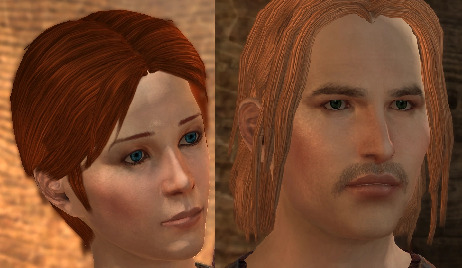
These boys are met by the Champion in Darktown, and they were brought to Kirkwall by a mage named Evelina who picked them up while escaping from the blight. Despite knowing that what she risked meant she would likely be sent to the Gallows, Evelina went to the Chantry to ask for help with the orphans.
Other than our limited interaction with her in 9:37 Dragon after she’s escaped the Gallows, we do see her begging in Darktown in 9:34. From this we know that, for at least 3 years, those orphan boys have been roaming the streets of Darktown without Chantry aid.
The only church-like quality we see from the Kirkwall Chantry is that it does provide a place of worship during daylight hours. It closes its doors at night. It does nothing to aid the refugees and the poor, and, in fact, asks from the people who need help the most. It shows us no evidence of helping children. And, through Elthina (discussed in the next installment), it shows no desire to change for the better.
Whether you agree with Anders’ actions or not, at least realize that it is a disservice to churches to call this gilded tower one of them.
Up next: Kirkwall’s Ticking Timebomb
533 notes
·
View notes
Text
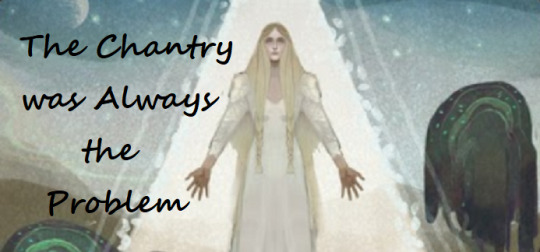
The Chantry was established by the Orlesian emperor Kordillus Drakon in -3 Ancient to follow the teachings of the prophet Andraste and her beloved husband and believed creator of all, the Marker. This predominant religion has shaped Thedosians in all walks of life, especially concerning one of it’s core principles:
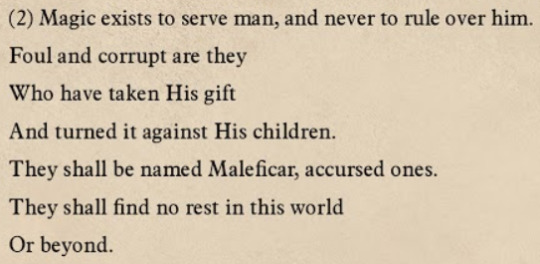
(Transfigurations 1, The Chant of Light)
This is part two of a seven part series on Anders
On the surface, it’s easy to claim that the Chantry is a church - something established entirely of a religious organization to help spread the Chant of Light so that the absent Maker would return to His children. However, religion is just one part of a much larger entity.
If asking Thedosians or Dragon Age fans, it would be safe to assume that the most controversial “religion” would be the Qun and it’s unnerving ways. However, the Chantry and Andrastianism is easily paralleled by the loathed Qun.
The Qun has three leaders: the Ariqun, the Arishok, and the Arigena. Respectively they oversee the priesthood, the military, and the way that society is nurtured and shaped. Likewise, the Chantry is comprised of the religion and its members (the leader as the Divine, Sisters, Brothers, etc), the Seekers of Truth (only briefly touched upon here) and the Templar Order as its military officials, and the implications of the Chant of Light as the way it nurtures society.
As in all religions, there is good that comes with the bad. It will not be argued that many, if not most, Chantries aim to do good. Many do take in orphans, help the poor or the sick, and give hope where all seems lost. Yet, the good doesn’t cancel out (or even outweigh) the bad.
The Templar Order was created, likely, with good intentions. No one would argue that those who possess magic are infallible. Mages carry a weapon within them that they did not ask for. And, because it is believed by the Andrastian faithful that the Maker turned from man because of the gall of mages (similar to the way that many of our real world religions fault women for the fall of man) and because mages were responsible for Andraste’s death, it is believed that mages are not to be trusted except in special circumstances.
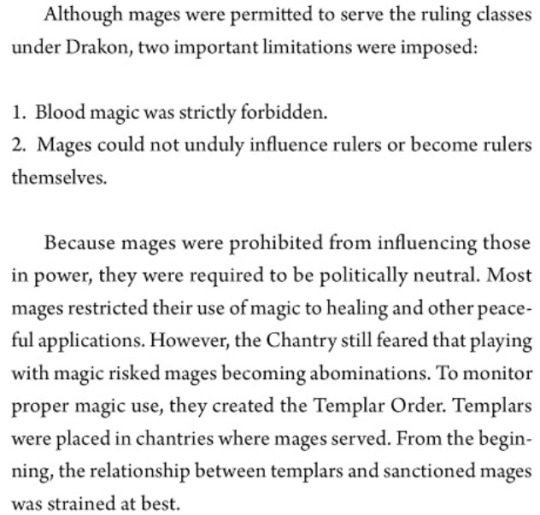
(Source: World of Thedas)
So, while the templars are simply supposed to exist to protect non-mages from the supposed evils of magic and also to protect mages from themselves, the Chantry dictates otherwise.
“Although the Circle is supposed to be autonomous, a heavy templar presence in all Circle towers has effectively made the organization an arm of the Chantry for ages.” (World of Thedas)
Alistair notes to the Warden on templars:

“Essentially they’re trained to fight. The Chantry would tell you that the templars exist simply to defend, but don’t let them fool you. They’re an army.”
This army gains its powers from lyrium, a substance that has many uses but certainly enhances magical abilities and the ability to dispel magic. Interestingly enough, the Chantry has a monopoly on lyrium trade as one of its main sources of income. Lyrium can be considered a drug as it is highly addictive and can be lethal if one takes too much or comes off of it too quickly. The Chantry keeps its templars addicted to it, rendering it difficult for them to leave.
The Chantry sends out its own military forces on groups they feel defy them enough. This has been done on the elves of the Dales, numerous times to the Tevinter Imperium, and was nearly called on Kirkwall by Divine Justina V due to growing unrest between the mages and templars in the Gallows.
It should be noted that the exalted march on the Dalish is easily considered the near genocide of The People (other than the “kindness” spared to them by offering the elves refuge in Alienages). And the treatment of the mages is nearing this as well.

“Mages cannot be treated like people. They are not like you and me.”
The first Circle was established after the second blight with the Nevarran Accord. The Circle was intended for “mentoring [mages’] use of magic for occasions when it would be required, like injury or war.”
The next part of this statement from World of Thedas is more telling: “[The Circles] became a refuse for those willing to bend to the Chantry-imposed conventions, and a prison for those who would not.”
The templars are trained to disrupt magical spells, but they are given power over mages that allows for significant abuse.The Chantry requires that templars steal mage children from their families and hunt down apostate mages living outside of their Circles. They oversee mages eat, sleep, and bathe. In many Circles, anyone acting out is treated with cruelty, sometimes beyond measure.


“I did not see good templars and evil mages in that Circle, Sister. I saw prisoner and jailers. The prisoners learned fear, and the jailers cruelty.”

“Oh, I know, I know. Most people enjoy being kicked in the head to be woken up each morning. Me, I’m just so picky.

There are even known instances where mages suffer unimaginable fates.


“I escaped from the tower seven times. After the last time, they put me in solitary confinement for a year.”
The mage Cole was forgotten and left to die in the White Spire Circle, and the record of it was washed clean as not to get the templar who forgot him in trouble.
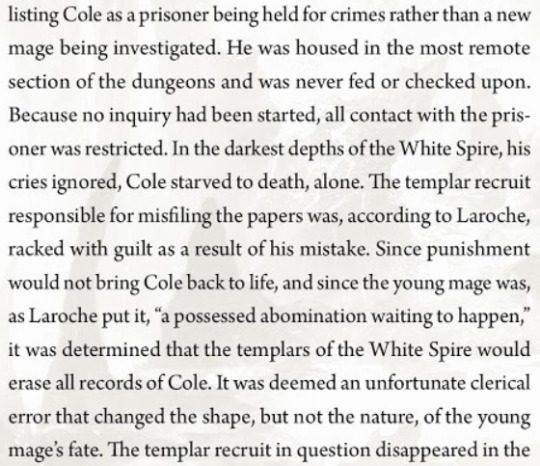
For mages (or mage sympathizers within the Circle) that upset the templars enough, they can even be sent to other prisons that are designed to tempt and harm.
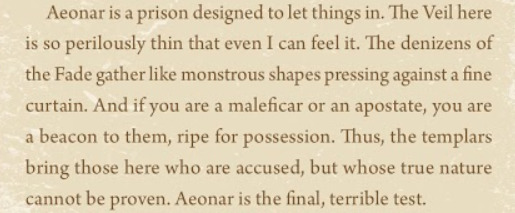
A journal entry from Chantry-initiate Lily, Jowan’s former beloved.
But while many of these mages know that they’re prisoners, the outside world believes that these Circles set up by the Chantry are schools.
While the Circles do teach mages in the arcane arts and Andrastianism (essentially teaching them that they are the reason the Maker has turned from the world), they very specifically choose what not to teach. Mages are not taught to properly defend themselves. They are not taught about other view points about magic such as those embraced by the Avvar and the Nevarrans or anything else that could make a mage curious about spirits or demons.
The one test that a young mage must perform in order to become a full-fledged mage is called a Harrowing.
“The Chantry considers mages who have passed the Harrowing no longer a danger to society - until they prove otherwise - and gives them a limited license to practice magic” (World of Thedas)
However, this test is secretive and doesn’t test against anything that has been previously taught in the Circle. All that a young mage knows is that failure to pass a Harrowing results in death.
When a mage undergoes it, they are forced into the Fade, and they are made to face a demon which they must resist.

(Author’s note - I’m convinced this is from Anders’ journal)
The entire point of the Harrowing is, supposedly, to prevent a mage being possessed by a demon and becoming an abomination. The picture of such a grotesque being with nothing but evil intentions:

However, we know of multiple instances of mages taking spirits into themselves and who have done good and wonderful things or have just kept to themselves:

Interestingly enough, most of them have undergone and passed their Harrowings. Also, the Circle also fails to teach that possession is reversible as seen through Fiona and the Avvar.
Mages who are deemed too weak to undergo a Harrowing or those who are too scared to submit are offered a solution known as Tranquility. This Rite was first discovered by the Seekers of Truth, the other military branch of the Chantry. This act is likened to lobotomy as it severs a mage’s tie to the Fade. In essence, it seemingly strips away the ability to be possessed, but it also strips the person of desires and emotions. A Tranquil is left as a husk of a person who is branded with the symbol of the Chantry on their forehead. Without their own ambitions, Tranquil can be used for the Chantry’s bidding. They are often used for menial work or as a means for income in addition to lyrium.

(Source: World of Thedas)
Unfortunately, a Tranquil’s condition lends them susceptible to abuse so long as they’re convinced of the “purpose” of such abuse.

“That’s right. Once you’re Tranquil, you’ll do anything I ask.”
The Seekers and the Chantry have long kept it a secret that the Rite of Tranquility is reversible. The discovery of this fact was a tipping point in the commencement of the mage/templar war.
Other than the direct implications the Chantry and its teachings have on mages themselves, they have a large impact on Thedosian society as a whole. Parents of mages are told to turn their children, sometimes as young as six, over to the templars. Entire nations have been vilified entirely because of their practices of other religion or encouragement of magic use. The Chantry bans books and authors, including self-proclaimed Andrasian Varric Tethras, for views differing from their core messages. Meanwhile, they recommend readings such as “How to Spot a Mage and Other Advice for Young Girls” by Sister Harriet.
Interestingly enough, “The Art of Parenting for the Good Andrastian” by “Sister” Geralinde was highly encouraged until recently. But the core message, no doubt, reached the mass of Andrastians:

(Source: World of Thedas)
This is haunting considering some of Kirkwall’s First Enchanter Orsino’s final words:

“Why don’t they just drown us as infants? Why wait? Why give us the illusion of hope?
In taking this back to the parallel to the Qun, one might argue that the Qun oversees the whole of Qunari society whereas the Chantry does not supersede the governing bodies of the individual countries that follow Andraste’s teachings. However, we have examples, specifically during the Dragon Age, where that is not the case.
When the Warden Commander and Anders look for his (or their) phylactery(ies), templars show up to arrest Anders despite his conscription:

“What? No, you can’t arrest me! King Alistair (and/or Queen Anora) allowed my conscription!”
The templar responds with the following:

“The Chantry’s authority supersedes the crown in this matter. You cannot hide within the Grey Wardens’ ranks.”
Anders poses this question during his time with the Ferelden Warden Commander:

“What’s to stop the Chantry from deciding mages in the Grey Wardens are apostates, too?”
It turns out they don’t care about the Rite of Conscription, something that could is supposed to supersede even a monarch’s orders, as seen in the Anders short story by Jennifer Hepler when we find that Anders, despite having his phylactery destroyed and being conscripted, has been hunted down by templar hires. This is when Anders and Justice decide to merge.
Therefore, the Chantry sees itself as the ultimate governing force in Thedas. It controls a military, shapes the way a nation thinks, and constricts itself against mages.
While tension during the Dragon Age hovers around the mages and the templars, it is easy to see that the problem lies with the organization that holds both groups. The mages are oppressed and pushed and abused, and the templars are allowed and sometimes encouraged to do it. Nearly 1000 years of turmoil, and no one acted to make change until the mages had had enough.
This is why Anders went after the Chantry specifically. He knew that you can’t go after the puppets when the puppeteer is pulling the strings.
Up next: Let’s Stop Pretending That the Kirkwall Chantry was a Church
206 notes
·
View notes